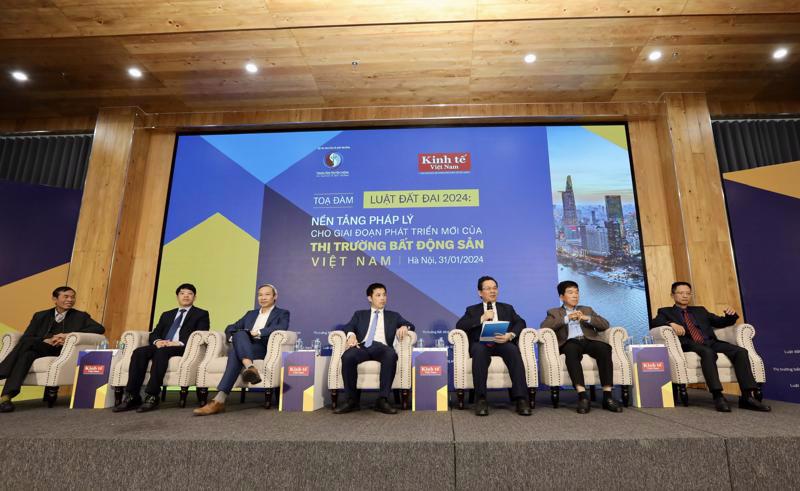Businesses expect that the amended Land Law will feature clear and transparent mechanisms and policies that encourage the effective use of land funds.
Such thoughts were shared by experts and business representatives in a discussion panel at the “Land Law 2024: Legal Foundation for the New Development Phase of the Real Estate Market” seminar held by Tap chi kinh te Viet Nam / VnEconomy in cooperation with the Center for Natural Resources and Environment Communications at the Ministry of Natural Resources and Environment (MoNRE) on January 31.
Mr. Nguyen Quoc Hiep, Chairman of the Vietnam Association of Construction Contractors (VACC), said that all economic sectors are closely related to real estate. Real estate plays an important role in the economy as a whole, so the Land Law is a key legal instrument and businesses therefore have great expectations over its effectiveness.
However, Mr. Hiep is concerned that the decentralization of powers to People’s Councils at the provincial and district levels will be a problem, and forthcoming circulars and decrees need to provide guidance on actual powers.
The amended Land Law will contribute to promoting resources from land funds. Businesses can increase the efficiency of land use, and clear mechanisms and policies would provide encouragement. As users, enterprises can also increase the efficiency of land use, and mechanisms and policies must be clearer.
Mr. Truong Anh Tuan, Lawyer and Deputy Secretary General and Head of the Legal Department at the Vietnam Real Estate Association (VNREA), said that during Vietnam’s innovation process, land has contributed major resources to socio-economic development in different periods.
The newly-approved Law is a great success, but to meet the expectations of the business community there are still concerns. Mr. Tuan believes that the biggest contradictions and conflict in the Land Law relate to consumer interest groups and economic development interest groups.
“The biggest conflict is in the residential real estate market, while other types of real estate, such as industrial real estate, have conflicts but not as great,” he added. “In fact, complaints and lawsuits mainly focus on types of residential real estate.”
Businesses represent economic development interest groups changing socio-economic and the urban face of localities, he went on. Therefore, the decentralization of power to localities needs to take into account factors protecting and developing domestic enterprises, not just strengthening foreign-invested enterprises.
From a business perspective, Mr. Dau Anh Tuan, Deputy Secretary-General and Director of the Legal Department at the Vietnam Chamber of Commerce and Industry (VCCI), said the Land Law has tried to codify the most important regulations but simply cannot cover everything.
In order for the law to come into practice shortly, he believes it is necessary to quickly issue decrees and guiding circulars, perhaps even this year. In particular, the oversight role of the National Assembly (NA) is important to ensure better legal enforcement.
He also noted that businesses and business associations increasingly play an active role when participating in contributing opinions and discussions related to the Land Law. When the business community participates “substantially, deeply and proactively”, any overlap in regulations and procedures will be reduced.
However, arising problems in practice are unavoidable, as was clearly seen in the implementation of the Land Law 2013. Mr. Tuan therefore said that during implementation, if businesses and partners find problems, they need to promptly respond to units to receive information.
Emphasizing the new points of the Law and its impact on the market, Mr. Le Van Binh, Deputy Director of the Land Department at MoNRE, told the seminar that it specifically stipulates 31 cases in which the State can recover land for socio-economic development for the national and public benefit (Article 79).
In addition, to perfect the financial policy on land, the mechanism for determining land prices under market principles, and the inspection and supervision mechanisms of the central government and People’s Councils in building land price lists, Mr. Binh said the amended Land Law has abolished government regulations on land price brackets, specifying principles and methods of land valuation.
“The amended Land Law is expected to resolve legal problems to effectively exploit land resources, remove difficulties facing businesses and projects, and contribute to helping the real estate market develop in a transparent and sustainable manner,” he noted.









 Google translate
Google translate